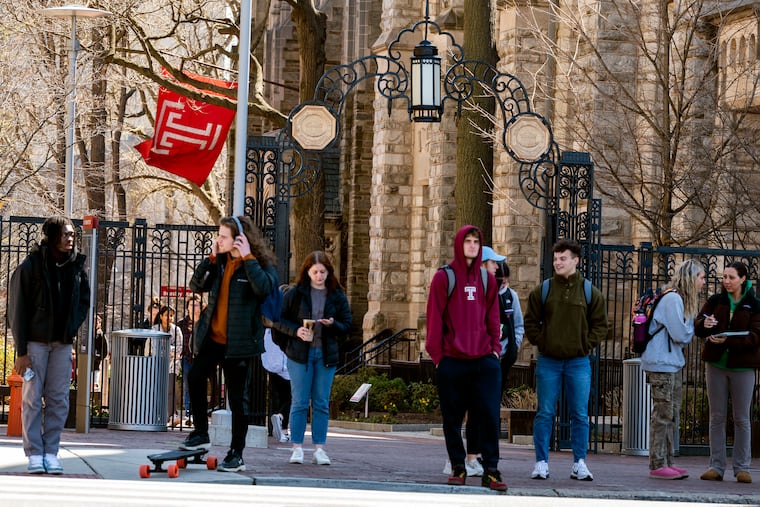Philadelphia needs Temple to thrive | Editorial
The university, a driver of the city’s economy and an engine of opportunity for Black Philadelphians, deserves strong leadership. But also help from its partners at the state and local levels.

Jason Wingard’s hiring in 2021 as head of Temple University — the first Black president in the school’s 137-year history — was widely heralded. Less than two years later, Wingard has resigned under a cloud of controversy.
His departure is a reminder that a new president alone is not enough to fix Temple’s problems. The university, long seen as a driver of the city’s economy and an engine of opportunity for Black Philadelphians, needs help from its partners at the state and local levels, as well as the guidance of strong leadership.
Criticism of Wingard began quietly, when he reshuffled senior positions early into his tenure. Some Temple boosters complained that he was overly focused on public relations, rather than running the school. Others were frustrated by the themes of his 2022 book — The College Devaluation Crisis: Market Disruption, Diminishing ROI, and an Alternative Future of Learning — which argues that college degrees will become less valuable going forward. An interesting theory for the leader of a university to hold.
» READ MORE: Temple is a campus in crisis. Jason Wingard is the wrong choice to fix it. | Will Bunch
A labor dispute with graduate students certainly did not help Wingard in his quest to find local allies, instead making him the face of strikebreaking in one of America’s most ardently pro-union big cities.
Still, Wingard tried to do good as president. Like many leaders during the pandemic, he was caught up in events beyond his control, including a drop in enrollment numbers that has affected colleges and universities across the country. Although it was criticized, the decision by Wingard to move into a rowhouse a couple of blocks away from campus was the right one. It was reminiscent of Richardson Dilworth’s choice as mayor to move into Society Hill in the 1950s, a similar demonstration of commitment. The university’s next president would do well to follow in that spirit.
Many of the challenges Temple faces require assistance from City Hall and Harrisburg. While Temple’s police officer association and other law enforcement advocates blamed Wingard for the campus’s safety issues, the university is more likely a collateral victim of the city’s rising crime problems.
Compared with nearby blocks, Temple’s campus sees significantly fewer fatal and nonfatal shootings. While Temple officials can and should do more to make their campus safe, they are swimming against a heavy current. Like many other pivotal institutions, the university has been mostly going it alone thanks to Mayor Jim Kenney’s abdication of leadership.
It isn’t just local government that has let Temple down. Lack of support from Harrisburg has led to rising tuition costs for the university and other state-affiliated colleges. For a school founded primarily to serve working-class students, that’s a significant hardship. Temple’s next president must find ways to keep tuition affordable and maintain the school’s mission of broadening opportunity.
» READ MORE: Temple president Jason Wingard on shooting of police officer: ‘We need help’ | Jenice Armstrong
Despite Temple’s public struggles, it is an integral part of our city. Research shows that the school generates billions of dollars in economic impact and supports over 40,000 jobs. Beyond the economic numbers, the school also serves nearly half of Philadelphia public school graduates who attend college locally and provides the city with many of its skilled workers.
The response to Wingard’s departure requires attention from more than just the university’s board of trustees. Government leaders at all levels need to pitch in to ensure the school has effective and innovative board members, enough resources to provide the affordable quality education it is known for, and can plausibly tell prospective students and their families that its increasingly residential campus is safe. (If the new coach, Adam Fisher, can get the men’s basketball team back in the NCAA tournament would be great, too.)
Philadelphia needs Temple to thrive, much as the university needs to regain its focus on serving the city and the region, which is what made it successful in the first place.